Q&A: Steffi and Dexter
Following the relaunch of their Klakson imprint, XLR8R sits down with Steffi and Dexter to hear the story.
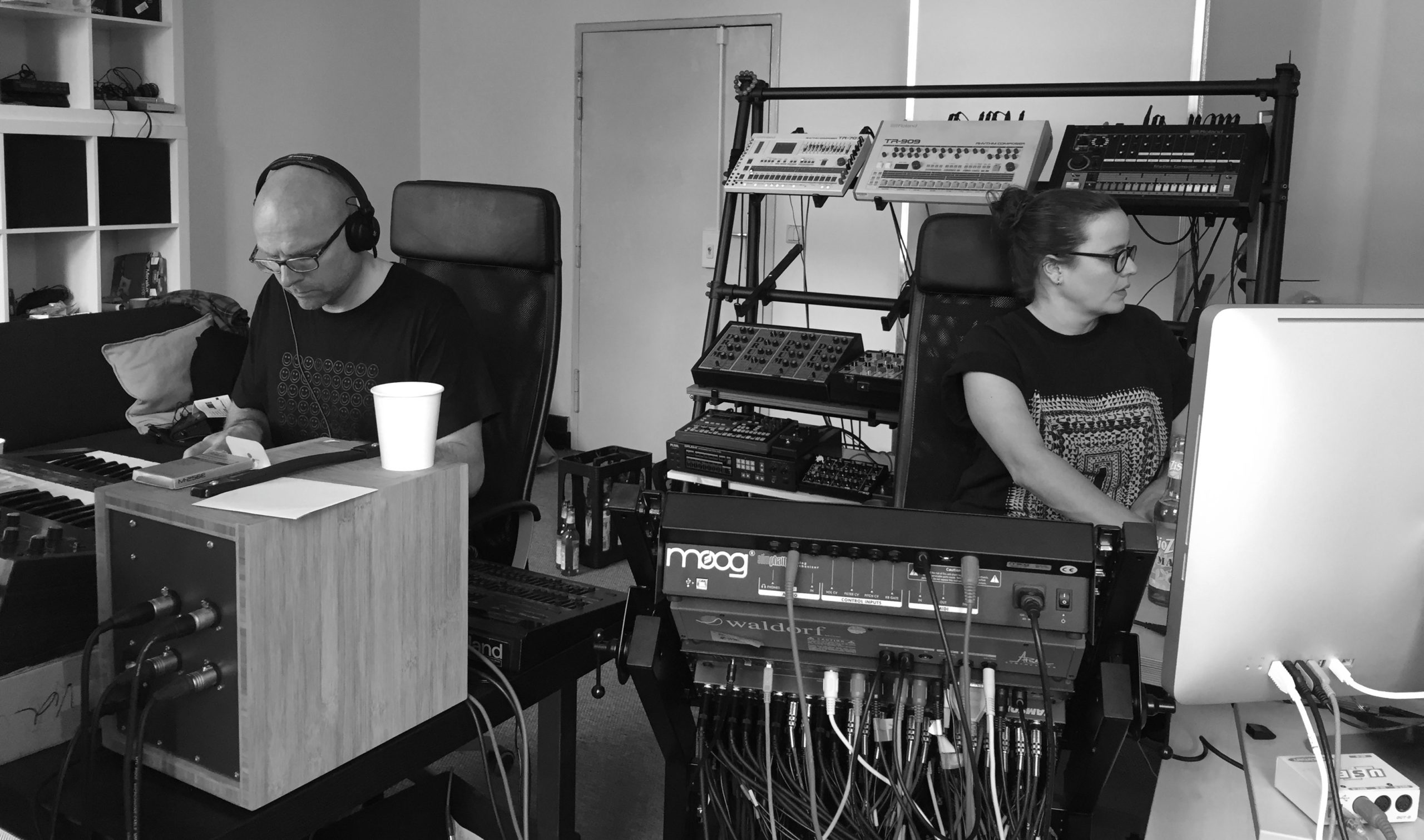
Q&A: Steffi and Dexter
Following the relaunch of their Klakson imprint, XLR8R sits down with Steffi and Dexter to hear the story.

Klakson Records: Born in 2000; dormant by 2010. But over the course of its decade-long tenure, Steffie ‘Steffi’ Doms and Remy ‘Dexter’ Verheijen’s electro-focused imprint grew from a grandiose project established to provide an outlet for the latter’s output into a linchpin in the evolution of the Dutch electronic music scene. While the quality of the releases, including notable classics by Mesak, FastGraph, mr. Cisco and Dexter himself, was fundamental in the label’s success, it was the tongue-in-cheek humour that gave the label an established identity in the market. Visibility, unlike many other imprints, was always kept to an absolute minimum, and releases were rolled out with little, if any, DJ promotion. “I don’t want or feel the need to convince the public that they should buy it because it was played by a certain DJ. I leave this entirely up to you guys to decide whether it is good,” Steffi explains.
The release of Dexter’s Troubles EP this week, however, marked the much-anticipated relaunch of the label, with more EPs scheduled for early next year. To learn more, XLR8R gathered Steffi and Dexter together for a rare side-by-side interview.
Where does the name Klakson come from?
Steffi: Basically it’s just like the klaxon—as in the horn. The idea was to name it after a horn to shout out to the world.
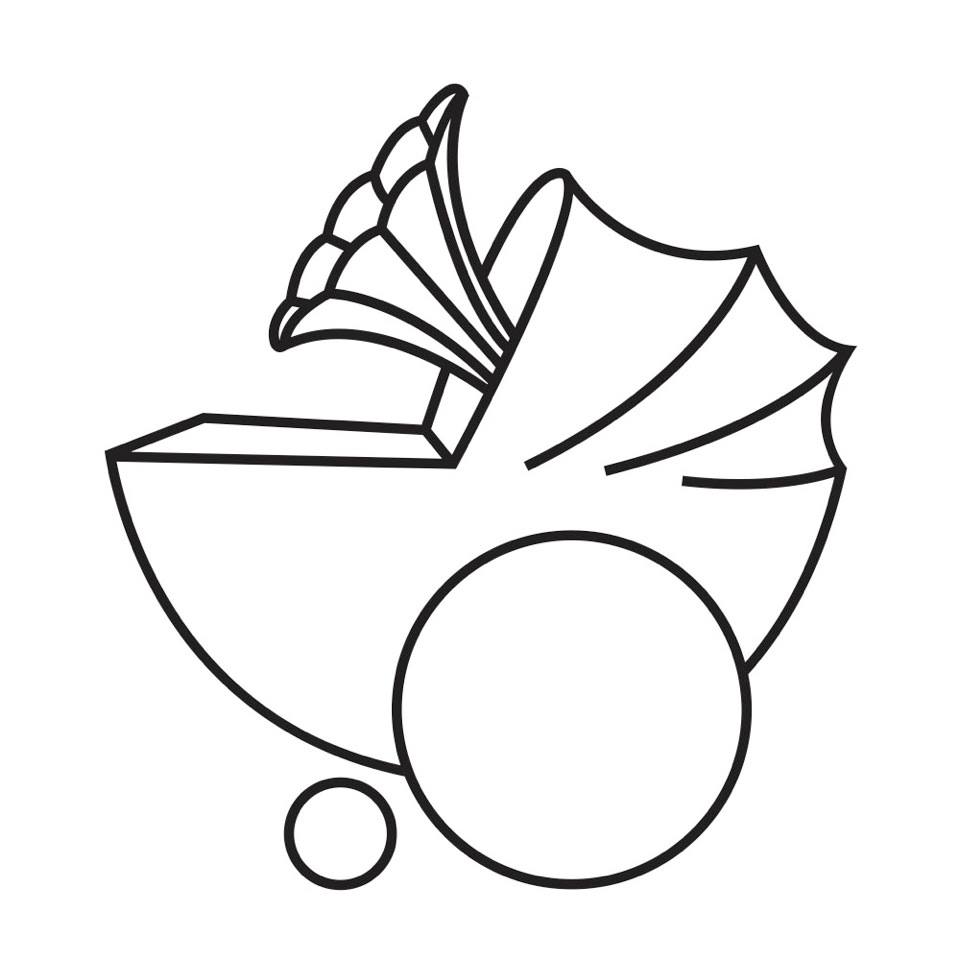
The label started in 2000, but where did you guys first meet?
Steffi: It think it was 1998, a year after I moved up to Amsterdam. We were introduced by Awanto 3. It was at an interesting party at the docks that we had been invited to play at, where they had five rooms with drum & bass, techno and ambient. They wanted us to do an electro room, and the electro room was literally— this is not a joke—four by four meters, with a big sofa in it. We were like, “Where are the people going to dance? This room is a living room!” So, we took the sofa out, and the irony was that everybody at the party was stuffed into that room. It was banging! Crazy. We played IDM, Warpy stuff, mixed with really hard electro. The whole party was empty, apart from everyone in that little box room. So funny.
And what were the original inspirations behind starting the imprint?
Steffi: It’s a bit vague, but what I remember is that Dexter had these tracks, and then we just thought that we should start a label, because we wanted to get them out. At the time, the situation in Holland was only Clone, Viewless and Bunker—like heavy, serious electro music with Drexciya and Underground Resistance influences. It was just such a boys’ thing; they were all battling and dissing each other. Amsterdam was not on the map, so when we met, we agreed that we should just start a label—and that we had to do something completely different.
Dexter: Yep! The main thing was that we were unhappy because we couldn’t release our own music.
Steffi: We knew that we had to do something really silly, with a silly logo, just to take the piss out of what those guys were doing. We needed to imply that everything was Dutch, so everything is written in Dutch. It’s just random shit that makes people go, “What?” You need to make sure that when you put something out, it needs to speak—which is why we started to take the piss!
How was this jokey attitude received by the other labels?
Dexter: Not well! I once went record shopping in Alkmaar, where they are all from, and they were all trash-talking about me. They we just like, “This is our scene! You’re intruding on our scene! We have been doing this for years, and it’s our scene.” So, that why I called the second record “Intruder.” It was funny!

Steffi: At first, we were just like, we don’t care—which is obviously where the first record (Dexter—”I Don’t Care”) got its name from. We even had pictures of people who donated ten euros on the sleeve. The small one was ten euros, and if you donated more, then you got a bigger picture. It was so ugly! If you look it up on Discogs, it is so ugly, it’s unbelievable. When the repress came, Clone asked if they could just slip it into a white cover, because it’s not as expensive. They were so unhappy with the sleeve, and so only the first 500 have that cover.

You can almost recognize a Klakson record simply by the artwork.
Dexter: Yes. One of the artworks is of my friends who lived in my house. We bought him a Klakson shirt and made him look like a hobo at the local square! Steffi took the photos of him from a distance!
Steffi: And then there was the thing with Rodger—a big electro freak. Every time we used to play he was there, right at the front—and we decided that we needed him for a cover! We started brainstorming, and Steffi took him to Volendam—the tourist fishing place where you can get dressed up in authentic gear. We took a lot of pictures of him with Japanese people and the 808 (Pauli Jylhankangas- “Clutz”; see below).
Dexter: In the past we would get asked about the covers, and I would say that they were at the store unit, and that you should collect them all in order to see the bigger picture—but there was actually no bigger picture!
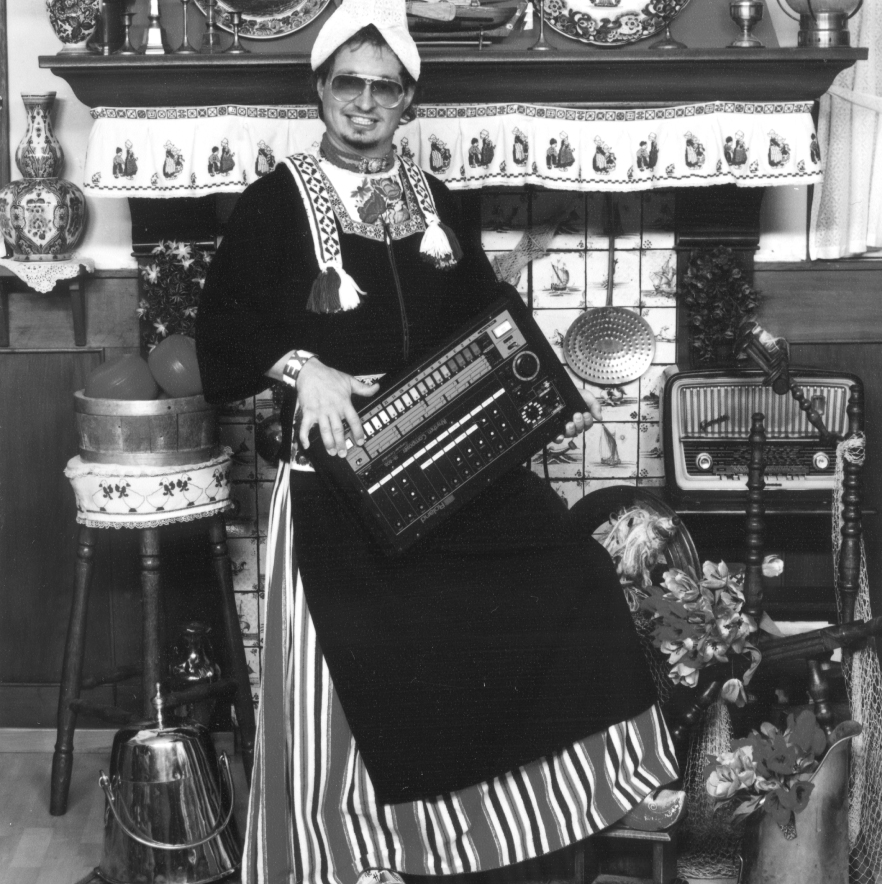
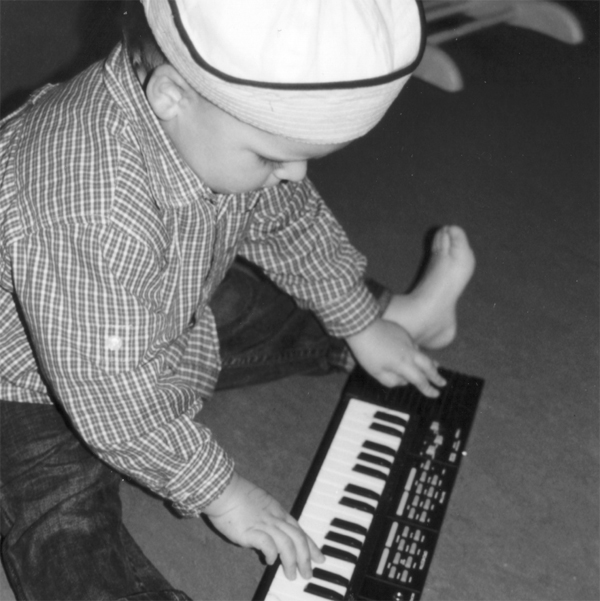
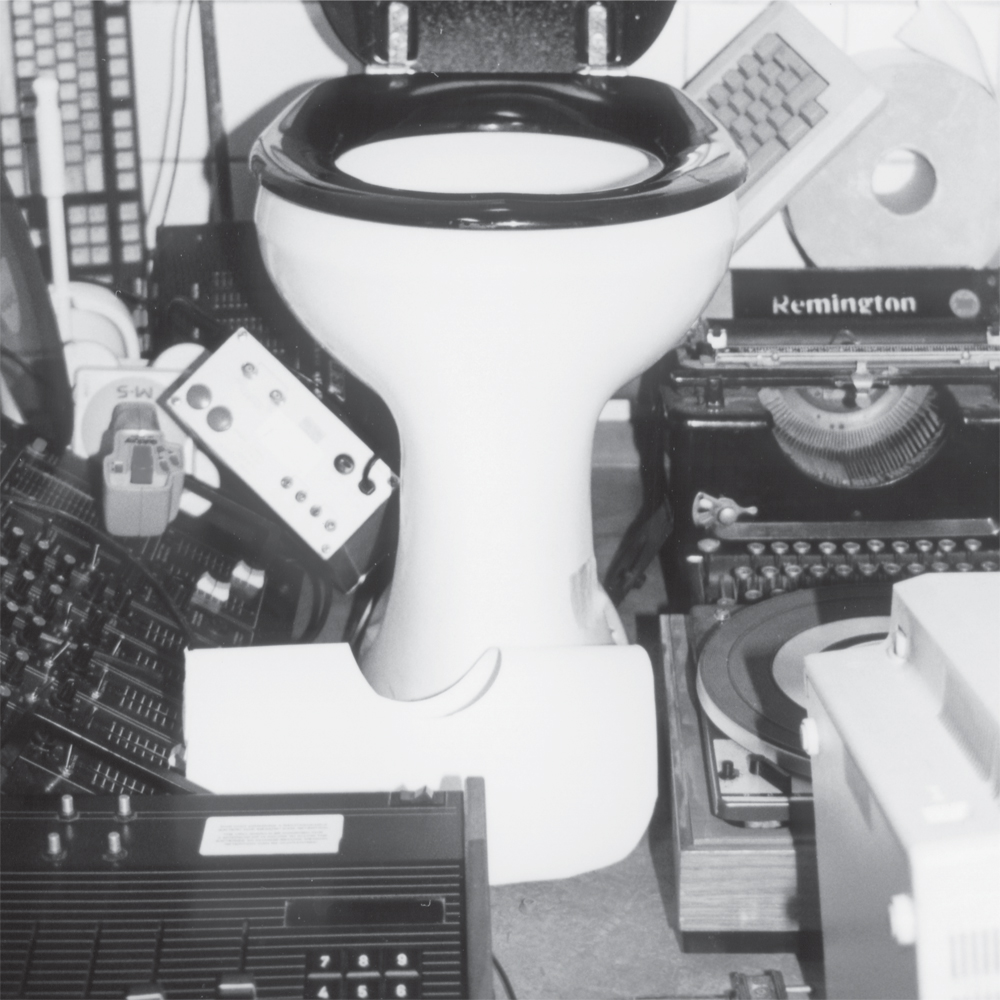
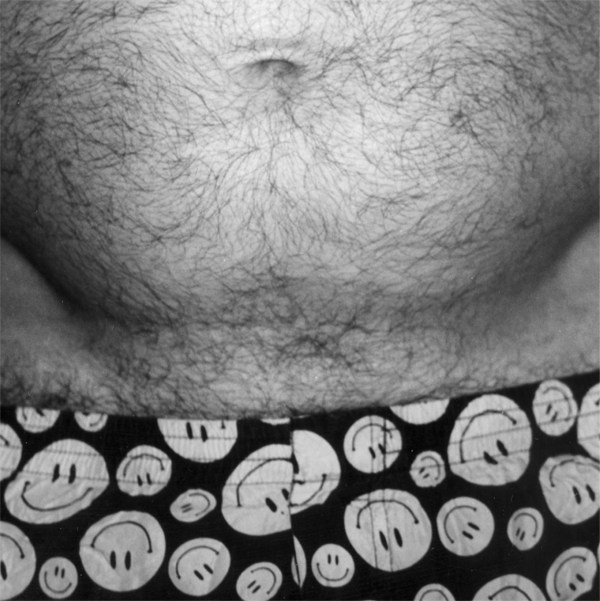
Who comes up with these ideas?
Steffi: It used to be Dexter and I—but now Lukas Keijser is doing it all, both because he lives in Berlin which is where the label is now based, and it is the perfect way for him to express himself. He’s an amazing artist; everything he does is so strong. His art is everywhere through the city too. He’s doing some stuff for Holly Johnson from Frankie Goes To Hollywood. People are really picking him up—it’s crazy.
Sonically speaking, do you think that the music you were putting out then was a fit for on one of these other electro labels, but you just didn’t like the seriousness of it?
Dexter: Yeah. Exactly that.
Steffi: Everybody used to diss each other. Later on, they had a forum run by a Dutch electro label, and they would start publicly each other! It was the first time we got connected to the internet, and it was beyond ridiculous.
Looking back, is it fair to say that that the label was more of a success than you anticipated?
Dexter: Yes! It exploded. I still had a part-time job, but I quickly had to quit that. Everything happened so fast!
Steffi: Yes. We gave the first EP to Clone, who were doing distribution, and they listened to it and said, “Well, we will distribute it, but we would never play it.” It got out there after we pressed 500 vinyls, and they called us to say that we needed to press another 500! Then Dave Clarke was doing this electro double-pack, and he wanted to get the track on the CD, which we thought was really cool. For a few weeks we were just doing reruns after reruns, and it was such a shock to those serious guys!
Now that the label has got a reputation to uphold, do you intend to keep that humorous side?
Steffi: Definitely! If you look at the sleeves, you can see that. Thing like shopping bags, ordinary everyday stuff—it’s just got to have a weird vibe!
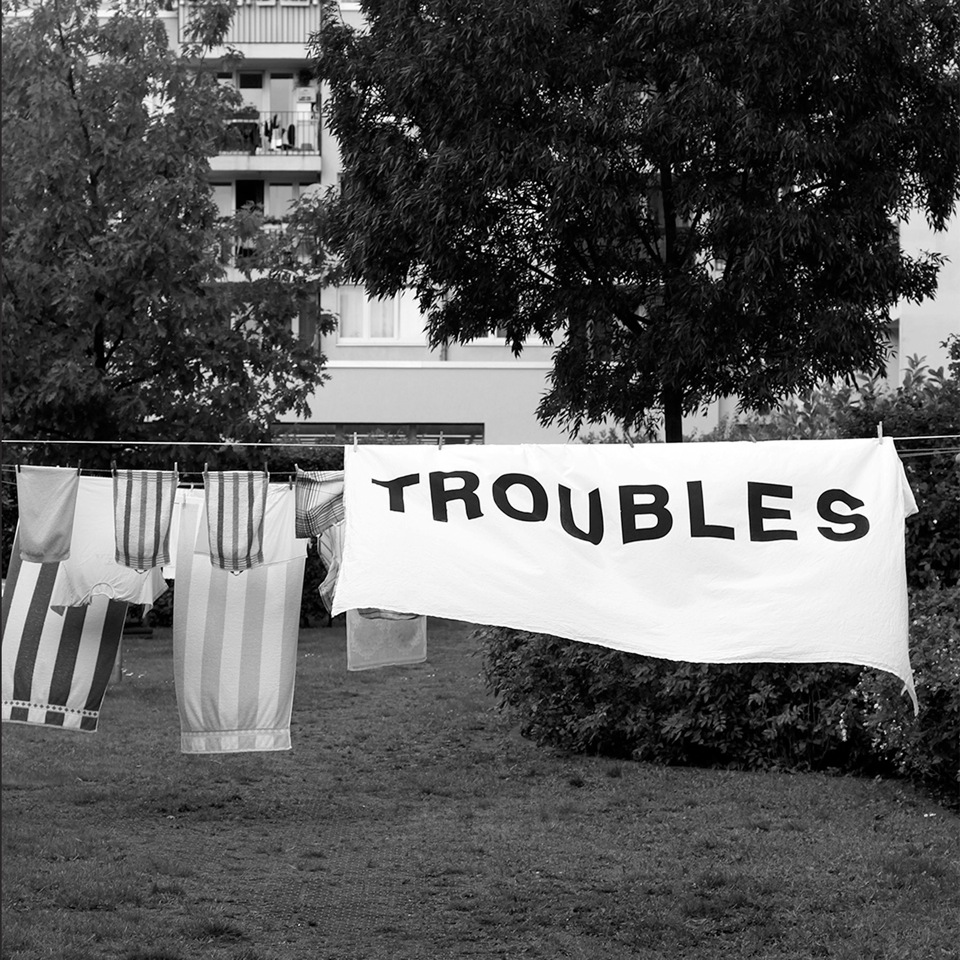
Why did the label go dormant in 2010?
Steffi: You phoned me up and said, “I’m not good at this whole A&R thing. I always have to judge other people’s music, and I’m not interested. I just want to do my own music.” You said, “You know what? You just continue, and I’ll concentrate on production.” I actually felt, with being in Berlin, that I wanted to do something different. It was exactly around that period of time that iTunes and digital music was getting really big, so I thought that I needed to pick up something new, and put the label to sleep for a bit. We always had the policy that we were only going to release something if we really wanted to release it, not because we needed to do a release to keep the label going. At some point I realized that there was nothing that we could release that suits the imprint. Minimal was very big, so we kind of slowly lost the abstract music, like Autechre and those guys. So that’s also when I said that I was going to do a new label, and put Klakson to sleep. That’s why I launched Dolly.
So by 2010 the market had changed—there had been a shift away from electro?
Steffi: Oh, a lot! A lot!
Dexter: I had done a few gigs around that time, and people were kind of enjoying my live set. Then directly after me there was some kind of minimal set, and it was only a kick, piano chords, and a delay, and the crowd went crazy! So I thought, “OK, I’ve got to find a job!”
When and why was the decision taken to restart the label?
Steffi: After we finished “Treasureseeking” for my album, we were like, “This is what we want to do! It feels good to be doing this kind of music again.” Working on that track gave us renewed enthusiasm for Klakson. We just naturally clicked into the whole producing thing together. That was new, because when he was doing Klakson releases, I was not anywhere near being able to finish a track—so there was no parallel world for us to both be in. When I finally got my music going, we agreed that we should actually try to do something in the studio.
“I don’t want to go out and badmouth techno, because I love having the chance to bang proper techno out—but it’s very linear though, and it’s not really surprising many people anymore.”
Is timing also a factor? Do you now feel that there is more space in the market for an electro-focused imprint than over the last five years?
Steffi: Yes. You know, in all seriousness, there’s a very nice development going on, like a side-scene next to techno, with a lot of young kids experimenting, and playing darker stuff. I went to Hard Wax recently and took a pile of records—and there was so much electro, weird stuff, U.K. influenced stuff, breaky kind of stuff. In all honesty, I don’t want to go out and badmouth techno, because I love having the chance to bang proper techno out—but it’s very linear though, and it’s not really surprising many people anymore.
Steffi, there were obviously some electro touches on your Power of Anonymityalbum. Was the relaunch Klakson partially motivated by a desire to have a platform to put out more electro productions?
Steffi: Absolutely. I have a lot of ideas, and it’s obviously nice to have lots of opportunities to release them on different imprints. Recently, Martyn, Dexter and I have coproduced Virginia’s album, which is going to come out next year. That has definitely got some interesting electro touches too. It’s like everything kind of connects, it’s interesting.
So are you spending time in the studio producing more electro influenced stuff?
Steffi: Yeah, I’d say so. I do so many different things though, but we are definitely now pretty stuck in that genre again.
“We’ve always just wanted to have quality tracks that we like to play in our sets, regardless of whether it is broken crazy stuff, or just simple stuff.”
It gives you quite a lot of artistic freedom, to be able to experiment on your own imprint.
Steffi: Yeah. That’s the good thing about when it’s your own money: You can just be like, “This is the shit. I don’t give a shit it it sells or whether we break even.” And we don’t need to be worrying about whether it is suitable for dance floors. We have never looked at that—we’ve always just wanted to have quality tracks that we like to play in our sets, regardless of whether it is broken crazy stuff, or just simple stuff.
Dexter: It also gives you a sense of community, which is important.
Steffi: I think that if you want to keep the creative level high, you have to have no expectations of making a living out of running a label. If you can break even, then you can also open the door to so many new people who already have music sitting there, and maybe nobody else is willing to take it on because it’s too risky, or not built for the dance floor, even though it is beautiful.
Can you spot a Klakson track immediately?
Steffi: Nope. His brains meets my brain, and we both go, “Oh!” That’s basically the key. It’s more a feeling. It’s basically just if we hear something, and decide that it’s for Klakson, you know?
Dexter: We might be talking about it as an electro label, but if we hear a track that has the right vibe, then that’s it.
So, sonically speaking, the label is not limited to just electro music?
Dexter: No, I don’t think so. It’s just got to be a bit different!
Steffi: It’s was always pretty diverse, even back in the day. There’s a wide range of stuff that’s been released. Electro is kind of the basis of what’s done on the label, but it is more than that.
Steffi, how will Klakson overlap with your other labels, Dolly and Dolly Dubs?
Steffi: I think the luxury of having several imprints is that when you have tracks that you feel suit one particular label, then you can put them on it! You could put them on both, sure. It’s not that everything that I have released on Dolly fits on Klakson; there’s a definite separation between the two. I think that Klakson is going to be far more in depth, and doesn’t necessarily need to touch any dancefloors—even though it is nice when it does.
“For us though, we just like to have records. I would never commit to a release that is digital only!”
Do you intend to do a vinyl pressing of each release?
Dexter: Definitely. You need something in your hand that you can touch!
Steffi: An MP3 is nothing. I remember how happy I was with my first record. We will always sell it to digital stores too, because there are a lot of people with an immaculate taste in music, but who don’t feel the need to buy the record because they don’t DJ. I don’t know, maybe they are working in an office during the day, and they like good music on their iTunes. It’s fine to fill that role too. For us though, we just like to have records. I would never commit to a release that is digital only!
Do you guys think that you’ll start a party around the label?
Steffi: Yeah. We are going to do a party in Rotterdam soon, around the next release. Then next year we are going to do some stuff in a few clubs. We’re not going to do anything too big because it’s a lot of work, and it’s not like back in the day when we used to organizing all these parties. There will be one-offs here and there.
Have you got anything lined up following the Troubles EP and the double pack next year?
Dexter: Yes. Before I went to Berlin to work on Virginia’s album, we also did a lot of tracks together for a new EP that still need to be finished. So that will be released on Klakson.
Steffi: There’s actually about four or five things pretty much ready to go!

